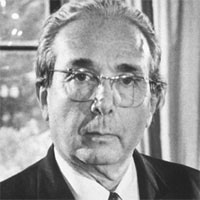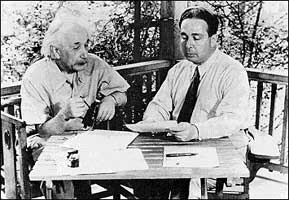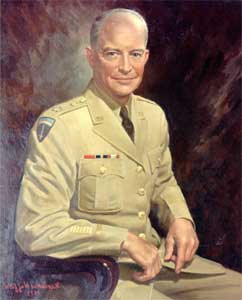|
Petition
to the President of the United States from 68 atomic scientists!!
July
17, 1945.

Dr.
Leo Szilard (1898-1964). |
|
In
July 1945, Leo Szilard—the father of the atomic bomb—sent
a petition to President Truman signed by 68 atomic scientists.
This petition asked the President to seriously consider the moral
implications of using weapons of mass destruction on the Japanese.
The President
was out of the country at the time—at Potsdam, Germany,
and he never saw the petition until his return on August 7—the
day after the bombing of Hiroshima.
General Groves
made sure that President Truman never saw the scientists' petition—until
it was too late!! |
In 1934, Dr. Leo
Szilard filed a patent for the world's first chain reaction and the
concept of a "critical mass" to create it. In 1939, he was
instrumental in getting Dr. Albert Einstein to write a letter to Roosevelt
about the dangers of Nazi Germany developing atomic bombs.
|

In Aug. 1939,
Leo Szilard asked Dr. Einstein to write a letter to FDR about the
danger of Nazi Germany developing an atomic bomb. |
|
Nobody
in the U.S. government listened to Szilard at that time. Even
the Italian scientist Enrico Fermi was reluctant to pursue atomic
research.
Dr. Szilard
continued to pursue atomic research at Columbia University in
New York City and his frequent nightmare was that Nazi Germany
would develop the bomb first.
After the
Pearl Harbor debacle, everything changed.
Szilard and
Fermi worked together at the Rockefeller owned University of Chicago
to develop an atomic reactor. Szilard invented the concept of
the "breeder" reactor to create plutonium for fuel and
atomic bombs. |
Dr.
Szilard developed the atomic bomb for ONE reason only: as a precaution
against an A-bomb attack on the U.S. by Nazi Germany.
With the defeat
of Nazi Germany in May, 1945, he saw no reason for using the bomb against
Japan.
The 68 scientists'
letter
|
"Discoveries
of which the people of the United States are not aware may affect
the welfare of this nation in the near future. The liberation
of atomic power which has been achieved places atomic bombs
in the hands of the Army. It places in your hands, as Commander-in-Chief,
the fateful decision whether or not to sanction the use of such
bombs in the present phase of the war against Japan.
We, the
undersigned scientists, have been working in the field of atomic
power. Until recently we have had to fear that the United States
might be attacked by atomic bombs during this war and that her
only defense might lie in a counterattack by the same means.
Today, with the defeat of Germany, this danger is averted and
we feel impelled to say what follows:
The war
has to be brought speedily to a successful conclusion and attacks
by atomic bombs may very well be an effective method of warfare.
We feel, however, that such attacks on Japan could not be justified,
at least not until the terms which will be imposed after the
war on Japan were made public in detail and Japan were given
an opportunity to surrender.
If such
public announcement gave assurance to the Japanese that they
could look forward to a life devoted to peaceful pursuits in
their homeland and if Japan still refused to surrender our nation
might then, in certain circumstances, find itself forced to
resort to the use of atomic bombs. Such a step, however, ought
not to be made at any time without seriously considering the
moral responsibilities which are involved.
The development
of atomic power will provide the nations with new means of destruction.
The atomic bombs at our disposal represent only the first step
in this direction, and there is almost no limit to the destructive
power which will become available in the course of their future
development. Thus a nation which sets the precedent of using
these newly liberated forces of nature for purposes of destruction
may have to bear the responsibility of opening the door to an
era of devastation on an unimaginable scale.
If after
the war a situation is allowed to develop in the world which
permits rival powers to be in uncontrolled possession of these
new means of destruction, the cities of the United States as
well as the cities of other nations will be in continuous danger
of sudden annihilation. All the resources of the United States,
moral and material, may have to be mobilized to prevent the
advent of such a world situation. Its prevention is at present
the solemn responsibility of the United States—singled
out by virtue of her lead in the field of atomic power.
The added
material strength which this lead gives to the United States
brings with it the obligation of restraint and if we were to
violate this obligation our moral position would be weakened
in the eyes of the world and in our own eyes. It would then
be more difficult for us to live up to our responsibility of
bringing the unloosened forces of destruction under control.
In view
of the foregoing, we, the undersigned, respectfully petition:
first, that you exercise your power as Commander-in-Chief to
rule that the United States shall not resort to the use of atomic
bombs in this war unless the terms which will be imposed upon
Japan have been made public in detail and Japan knowing these
terms has refused to surrender; second, that in such an event
the question whether or not to use atomic bombs be decided by
you in the light of the consideration presented in this petition
as well as all the other moral responsibilities which are involved."
(Leo Szilard, His Version of the Facts,
pp. 211-212). |
General Eisenhower
said that the A-bomb was unnecessary!!
|

General
Eisenhower (1890-1969).
President of the U.S. from 1953-1960). |
|
General Eisenhower —the
Supreme Commander of the Allied Forces in Europe— was
in Berlin, Germany, when President Truman was meeting with Stalin
at Potsdam.
He was NEVER
consulted on the A-bomb decision. Leahy, Groves and Byrnes made
sure that President Truman was surrounded by "YES"
men!!
"The
incident took place in 1945 when Secretary of War Stimson, visiting
my headquarters in Germany, informed me that our government
was preparing to drop an atomic bomb on Japan. I was one of
those who felt that there were a number of cogent reasons to
question the wisdom of such an act. I was not, of course, called
upon, officially, for any advice or counsel concerning the matter,
because the European theater, of which I was the commanding
general, was not involved, the forces of Hitler having already
been defeated. But the Secretary, upon giving me the news of
the successful bomb test in New Mexico, and of the plan for
using it, asked for my reaction, apparently expecting a vigorous
assent.
"During
his recitation of the relevant facts, I had been conscious of
a feeling of depression and so I voiced to him my grave misgivings,
first on the basis of my belief that Japan was already defeated
and that dropping the bomb was completely unnecessary, and secondly
because I thought that our country should avoid shocking world
opinion by the use of a weapon whose employment was, I thought,
no longer mandatory as a measure to save American lives.
It was my belief that Japan was, at that very moment, seeking
some way to surrender with a minimum loss of "face."
The Secretary was deeply perturbed by my attitude, almost angrily
refuting the reasons I gave for my quick conclusions."(General
Eisenhower, The White House Years, pp. 312-313). |
The military—like
the Vatican—is a HIERARCHY and no matter what the personal
opinions of the lower ranks it doesn't matter because once an order
comes from the top . . . it MUST be obeyed....That is why the Pentagon
is the greatest threat to the U.S. Republic. There is no place for
a MILITARY HIERARCHY—in this Republic or any Republic
. . . except to repel an invasion should it occur.
Official
Chronology of Leo Szilard—the father of the atomic bomb
Date |
Event |
1898 |
Leo Szilard
is born in Budapest, Hungary. |
1917 |
Drafted into
the Austro-Hungarian army. |
1922 |
Receives
a Ph.D. in physics from the University of Berlin. |
1927 |
Files the
first of 8 patents with Albert Einstein for an electromagnetic
pump, which became the basis of cooling systems in "breeder"
reactors. |
March
1934 |
Patents the
chain reaction concept in London, England. |
August
1934
|
Conducts
atomic research at St. Bartholomew's Hospital in London. Invents
the Szilard-Chalmers effect for isotope separation. |
July
1939 |
Drafts a
letter with Einstein's signature to FDR warning about the danger
of Nazi Germany developing atomic bombs. |
Feb.
1942 |
Moves to
Chicago with other Columbia scientists becoming chief physicist
of the Manhattan Project at the University of Chicago. |
Dec.
1942 |
With Enrico
Fermi put into operation the world's first chain-reaction atomic
"pile" (reactor) of their design |
Jan.
1943 |
Prepares
a memo on the first of three designs for a "breeder"
reactor (a name he coined) to create plutonium for fuel and A-bombs. |
March
1943 |
Becomes a
U.S. citizen. |
Aug.
1944 |
Proposes
a postwar arrangements for national and international control
of atomic energy (to curb what he predicted would be a U.S.-Soviet
arms race) almost one year before the first A-bomb was tested. |
March
1945 |
With an Einstein
letter seeks an appointment with President Roosevelt to present
scientists' views about wartime and postwar use of A-bombs. FDR
dies before their meeting. |
May
1945 |
Tries
to meet President Truman at the White House but is sent to Spartanburg,
South Carolina, to meet private citizen Jimmy Byrnes. |
July
1945 |
Organizes
a scientists' petition against dropping A-bombs on Japan, but
it never reaches President Truman because he is hustled
out of the country to Potsdam, Germany. |
1960 |
Receives
the U.S. atoms for peace award. |
1964 |
Dies of a
heart attack at his home in Ja Jolla, California. Dr. Szilard
should have received 2 Nobel prizes: One for PHYSICS and another
for PEACE but his anti-Fascist and pro peace with Russia views
cost him both. |
Vital Links
References
Eisenhower,
Dwight D. The White House Years. Doubleday & Co., New
York, 1963.
Lanouette,
William. Genius in the Shadows. A Biography of Leo Szilard. The
Man Behind the Bomb. Charles Scribner's Sons, New York, 1992.
Szilard, Leo,
His Version of the Facts. The MIT Press. Cambridge, MASS.
1978
Back to Main Menu
|


